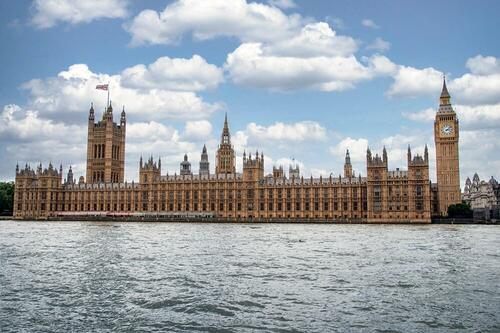
UK Government Tech Policy Must Become Very Libertarian, Very Quickly
Submitted by Preston Byrne
Friday’s edition of the Washington Post reveals that the United Kingdom has served Apple with a secret order, a so-called capability notice under the Investigatory Powers Act 2016, demanding that Apple create a backdoor to its encrypted cloud storage systems that would permit access on-demand by UK government officials.
The Post also reports that, in response, Apple is likely to withdraw its services from the UK rather than comply. Apple told Parliament, in March of last year, that “[t]here is no reason why the U.K. should have the authority to decide for the citizens of the world whether they can avail themselves of the proven security benefits that flow from end-to-end encryption.”
Those of us with an English law education will recall Sir Ivor Jennings’ famous quip – “if Parliament enacts that smoking in the streets of Paris is an offence, then it is an offence” – as an illustration of the theoretically absolute power of the King-in-Parliament.
Our world is a very different place than Sir Ivor’s: for, when Apple turns off its services in the UK in defiance of a Home Office capability order, it may violate British rules, it will also undermine British authority. The streets of Paris are hundreds of miles away; the Internet is at our fingertips and, if formally blocked by the government, informally accessible via VPN.
So far, UK politicians have not appeared to have the stomach to regulate VPNs; by attempting to legislate over that which they do not control, they risk weakening public faith in the law.

This is the latest in a long line of proto-totalitarian conduct emanating from the UK’s security services with which the Americans are growing increasingly impatient. Nor is the Investigatory Powers Act the only law on the UK’s books which threatens global companies with fines, or worse, if they fail to act as the UK security state’s proxy arm. Popular U.S. encryption company Signal said in 2023 that if the content moderation requirements of the Online Safety Act – with which Signal necessarily cannot comply because it is end-to-end encrypted – required it to decrypt messages to carry out the mandatory content-policing functions called for by the law, Signal would “absolutely 100% walk” away from the United Kingdom rather than obey.
Similarly, the UK’s official broadsides against social media companies in the wake of the Southport riots, and arrests of social media users, were pilloried by millions of social media users in America, and regarded with considerable suspicion by the US tech industry. Considering that preeminent tech VC Marc Andreessen has been a vocal opponent of online censorship, both in the US and in the UK, it is not a stretch to think that Andreessen Horowitz’s closure of its UK office two weeks ago – effectively that firm saying that the UK is an uninvestable country – is related to the UK’s heavy-handed approach to political freedoms on the Internet.
The UK has not, as yet, attempted to wield the Online Safety Act quite that aggressively. Given that a Labour government is in power – and, as Labour’s leaders come neither from the technology sector nor global business, they do not understand what leverage they truly have in either domain – I am confident that, at some point, they will attempt to do so.
The inescapable reality they will face at that juncture is that tech capital is highly mobile, as the ASI has shown in recent research showing that millionaires are leaving the country in droves, and that the UK is not an especially large digital market compared to the United States or even compared to the neighboring EU. If the UK government’s feature requests are likely to scare off users in these larger jurisdictions, companies are likely to jettison UK business, and their executives likely to avoid traveling through Heathrow, before they will comply with orders that compromise their users’ freedoms or their privacy.
If Kamala Harris had won the U.S. election in November, we would doubtlessly be looking at a very different playing field for UK Internet regulators. The Biden Administration was highly sympathetic to technology companies who were willing to censor their users for traditionally left-coded political ends, as was revealed in the Twitter Files disclosures by Matt Taibbi and Mike Shellenberger after Elon Musk’s acquisition of that website. We also now know that government funding was used to fund counter-disinformation and pro-U.S. propaganda apparatuses abroad, including efforts to study how to censor U.S.-based platforms and their users under the guise of academic research.
There is new management in America, however, and the extent to which taxpayer dollars were deployed for use in partisan political fights was so offensive to the incoming administration that they are planning immediate reductions-in-force of up to 70%. Entire agencies, like USAID, the Department of Education, and possibly many others, have been deemed too politicized to be worth saving – and are being deleted wholesale.
Put differently, the permanent bureaucracy in the United States which might otherwise have helped the UK apply informal pressure on Americans who dared to disobey its decryption and censorship edicts – none of which, it bears mentioning, are enforceable against an American who refuses them and is happy to avoid setting foot in British territory – is gone.
If the UK chooses to be the worst place for an AI company, or a social media company, or a digital asset company to incorporate and do business, it will find that it has very few such companies. Regardless of your opinions on how British society should be structured, the NHS, immigration, or the appropriate quantum of social welfare, if you don’t have high tech employers generating revenues and paying taxes, social programs become very difficult to pay for.
If the United Kingdom wants to be a technology backwater, that is its choice. I am not optimistic that decades of bad policy, practically all of which was enacted by the Conservatives, can be reversed, even where it is patently obvious that these policies will be rather straightforwardly ignored, either by companies throwing these orders in the trash can when received in the post in America, or by simply cutting off their world-beating tech security services to UK nationals.
Either outcome is a terrible result for the British people, as it leaves the entire UK more vulnerable to scammers, criminals, and foreign adversaries than they otherwise would be – not because of corporate disobedience, but because the only services UK nationals will have access to will be ones which compromise user security and safety for the sake of British politics, something all of the best companies will be unwilling to do.
Those of us who have been around for a minute recall the brief moment between 2019 and 2021 when there was a broad consensus across the leaders of the western world that the Internet needed to be censored for public safety reasons. That moment has passed, and the biggest market in the world – the United States – is now charting a different course.
The UK’s tech sector is smaller, slower, and less well-funded than America’s – for very easy-to-understand reasons. If it wants to compete with America, it has to become more American than America. This is something the Conservatives broke and, based on their current policy platform, have no desire to fix. The only question is who will change the UK’s posture on tech regulation – Reform or Labour – and whether they’ll be able to get the changes done in time to avoid being left floundering in America’s wake.
Tyler Durden
Tue, 02/11/2025 – 03:30














